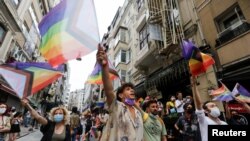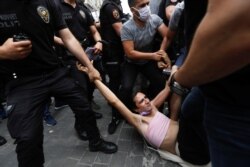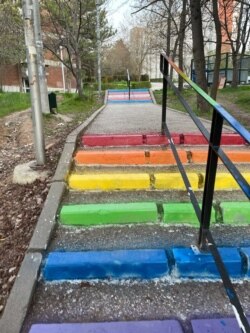More than a month after Turkish authorities crushed Pride-themed events in Istanbul, emotions still run raw for members of the country's embattled LGBT community.
"There was lots of violence. I was beaten up and so were most of the people I was arrested with," Istanbul resident Alaz Yener told VOA. "They used zip ties to handcuff us, hands behind our back, and refused to cut the zip ties off for a long time."
Yener, who is non-binary, was detained when security forces broke up an attempted Pride parade in Taksim, a central Istanbul borough. Other LGBT-themed gatherings were also disrupted in the city in June, recognized as Pride month for sexual minorities in many parts of the world.
"The violence, and also the way the police dehumanized and insulted us at every chance, trying to assert as much control as possible on everything we did, it was all very stressful," Yener said.
Branded as 'deviants'
Even before the suppression of Pride events, Turkey's LGBT community found itself in the spotlight of national politics and at the core of student activism.
In February, President Recep Tayyip Erdogan spoke of sexual minorities with contempt, claiming in a televised speech that, in a moral nation like Turkey, LGBT people do not exist.
Meanwhile, Turkish Interior Minister Suleyman Soylu on Twitter labeled student activists as "LGBT deviants," prompting the platform to flag the post for hateful content.
Tensions with authorities flared when students vehemently protested Erdogan's appointment of a political ally as rector of Istanbul's prestigious Bogazici University, which has a strong LGBT presence. The dispute at Bogazici intensified after a poster depicting the Islamic holy site Kaaba with LGBT flags was displayed on campus as part of the protests.
The appointed rector, Melih Bulu, recently stepped down. But student protesters allege university officials have unleashed a wave of retribution against them, from canceling scholarships to expulsions.
"The rescinding of the scholarships, the detainments, how some students are currently barred from leaving the country and therefore are unable to continue their education, it's all very grim and upsetting," said Yener, who frequently visits the university but does not study there.
Conflicted emotions
Recent events leave some LGBT Turks with conflicted emotions, including Nurefsan Bolat, a resident of Ankara who is also non-binary.
"I feel discouraged and hopeful as well. It isn't a surprise for the police to attack almost any protest in Turkey. Thus, it affects me less protest-by-protest," Bolat said. "I'm hopeful starting with the latest update about the Bogazici protests led to Melih Bulu's departure. I'm also feeling hopeful when I meet new advocates and LGBTI+ rights defenders in Turkey, and even seeing more rainbows left behind after Pride month makes me feel hopeful about the future."
Beyond headline-grabbing confrontations, Turkey's sexual minorities face more mundane challenges in everyday life.
"I can say mostly (that) I feel threatened by discrimination in many contexts for my sexual orientation and gender identity," Bolat said. "For example, anytime I meet a new person or get into a new environment, coming out always comes with consequences. In addition, since I have a very religious and conservative family, hiding from them is exhausting and very disappointing."
Summing up the experience, Bolat said, "Being an LGBTI+ community member in Turkey is a continuous fear of stereotype and discrimination threat."
Legal protections absent
Legal experts say Turkey's statutes are not hostile to LGBT people.
"There is virtually no legal regulation that prohibits homosexuality or defines it as a crime," an attorney who requested anonymity told VOA while noting that repression and violence against sexual minorities continue unabated.
"With the combination of state targeting of homosexuals from the highest level of government, the crimes of violence and murder against homosexuals, which are insufficiently investigated and prosecuted, ... the systematic prohibition of marches and events and the restriction of freedom of expression, homosexuals in Turkey cannot live freely with an open identity," the lawyer explained.
While a growing number of countries has enacted laws to protect sexual minorities and safeguard their rights, Turkey has not followed suit.
"The provision of certain rights such as legal recognition, marriage, inheritance, adoption and social security payments for same-sex couples does not exist," the attorney said. "For this reason, we can say that although homosexuality is not technically illegal in Turkey, it is actually prohibited by state practices."
Despite disruptions of this year's Pride celebrations, many LGBT Turks express grit and determination as they look to the future.
"The LGBT rights movement in Turkey is several decades old and has survived and made progress in a variety of social and political climates," Yener said. "I believe that we will continue to survive and fight for justice and liberation, and it will get better."







